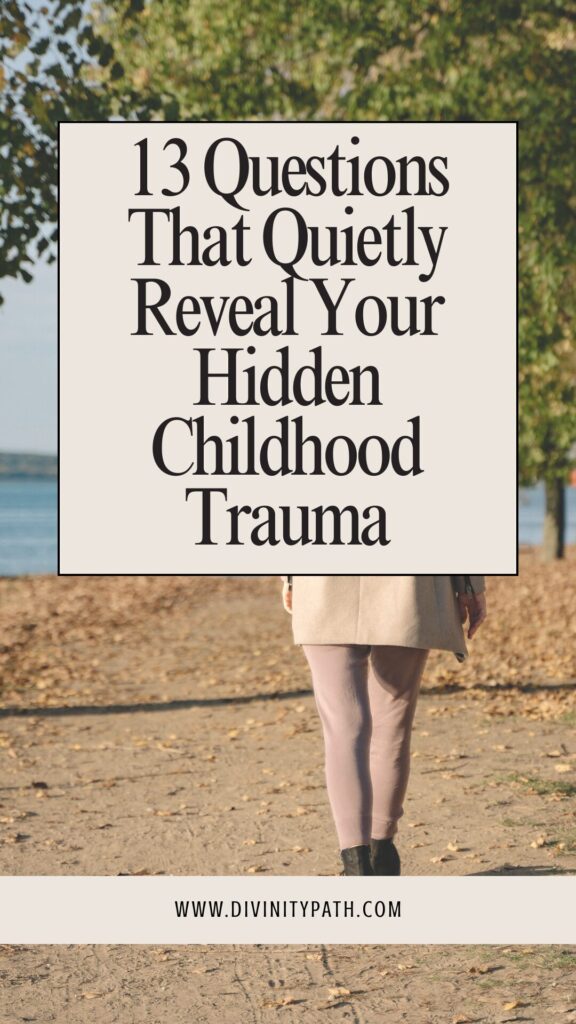13 Questions That Quietly Reveal Your Hidden Childhood Trauma
Let’s be honest: most of us didn’t grow up in perfect families. Some experienced obvious trauma—emotional neglect, criticism, rejection, abuse. Others had what seemed like a “perfectly fine” childhood, yet still feel deep down that something isn’t quite right. Maybe you struggle to connect with others, you react quickly, have trouble with closeness or trust, or sometimes just “shut down” in certain situations. And you ask yourself—why?
Admitting you experienced childhood trauma isn’t easy. Especially when it stems from your family of origin. There’s often guilt, shame, or even a feeling that you’re exaggerating. Maybe you’ve told yourself: “It wasn’t that bad.” Or “Everyone has something from childhood.” And sure, there’s truth to that. But the fact remains: unresolved trauma doesn’t just disappear. It stays trapped in our bodies, our patterns, our relationships, our emotional reactions. It often begins to resurface later in life—in relationships, through parenting, or in those moments when it feels like something inside is holding you back and you can’t quite name what it is.
That’s why I wrote this article. Here are 13 questions that might help you recognize possible childhood trauma that could still be affecting your life—even if you’re not aware of it.

13 Questions to Recognize Childhood Trauma
1. Do You Constantly Seek Approval?
Ask yourself honestly—do you often wonder if you’re enough? Do you worry about whether people like you? Do you feel like you have to prove it over and over again?
If you weren’t seen as a child—truly seen—then you may have grown into an adult stuck in a never-ending cycle of seeking validation. And no, it’s not your fault. It’s the result of emotional hunger that wasn’t met when you needed it most—as a child.
If you’re in a relationship or friendship today and feel like you’re constantly checking whether you’re still “okay” with them—this might be a sign that you’re still seeking something you never received. Unconditional love. Not tolerance. But that real, “You are worthy.” And if you never heard it then, it’s only natural that you’re still searching for it now.
You might also love:
- The Real Foods That Support Women’s Hormonal Balance
- 11 Things to Stop Caring About If You Want a Happier Life
- Buddha Teachings on Life That Will Shift Your Perspective
2.What Did You Need Most As A Child—But Didn’t Get?
This question is powerful. And honestly? It can be really hard to answer. Because sometimes we don’t even know exactly what was missing—we just know something wasn’t right.
Ask yourself: did you long for more affection? More safety? To be listened to? Or simply to be protected when things were hard? Answering this question won’t give you someone to blame. It’s not about pointing fingers at your mom, dad, grandma… It’s about feeling: “This is what I needed. And it wasn’t there.” And even just that realization—without blame—can shift so much.
3. Do You Focus On Others More Than Yourself?
Do you feel like you have to take care of everyone around you? That you’re responsible for how others feel? That you need to be “nice” so they’ll love you? Many of us who experienced emotional neglect developed this exact pattern. We became people who are excellent at caring for others—yet almost forget ourselves.
That’s because, as a child, maybe you only received love when you were “good.” When you were quiet. When you didn’t cause trouble.
If this sounds familiar, it might be time to slowly start asking: “What about me? What about my needs?”
4. How Have Your Childhood Fears Affected Your Adult Life?
Are you afraid of rejection? Criticism? Do you feel like you always have to be the best—because if you’re not, you’re not enough? Fears from childhood don’t just go away. They usually follow us into adulthood—but now they wear the suit of perfectionism, control, anxiety…
Ask yourself: what were you afraid of as a child? Was someone often angry at you? Did you always have to watch your tone around your parents? Did something terrible happen—and you had no voice in it?
Those fears might still live in you today—and shape how you work, love, react. And once you notice that, you can begin to shift it.
5. How Do You React To Conflict And Criticism?
This is an important question. Because the way we respond when someone challenges or criticizes us often reveals more about our past than the present moment.
Do you shut down immediately? Do you start apologizing? Do you withdraw? Or do you “explode” because you were never allowed to express your opinion? Children who grow up in environments where anger felt dangerous often become adults who avoid conflict at all costs. Even when it would be healthy to set a boundary.
If conflict feels terrifying—if it makes you feel like you’re not allowed to be you—it’s very possible that this is a result of unresolved childhood trauma. And it’s exactly in these reactions where healing can begin.
6. Do You Dismiss Your Own Achievements?
This is a classic sign: you achieve something, you work hard, reach a goal… and then you say, “Eh, it’s nothing.” Or you’re so self-critical that nothing ever feels good enough. Even when you get praise, your mind whispers, “I just got lucky.” Sound familiar?
This often comes from a time when no one said “well done.” When your accomplishments were ignored or minimized. Maybe you were even punished for your success—because you stood out too much.
Today, you might be an adult who doesn’t know how to celebrate yourself. And that’s a shame. Because you deserve to feel proud. Every small step counts. Every single thing you’ve done. And if no one gave you a pat on the back back then—you can do it now. Or find people who do see you.

7. Do You Often Overburden Yourself – And Justify It?
Ask yourself honestly: Why do you keep taking on too much? Why do you feel guilty when you take time for yourself? Many adults dealing with emotional wounds from childhood feel like they must do everything alone. Take responsibility, fix others, “get life together.”
If, as a child, you often felt like you had to be the one to smooth things over or make up for what the adults couldn’t handle – this could be a sign of unrecognized trauma. Maybe you had a parent who couldn’t carry their own burdens, so you carried them instead.
This constant need to prove your worth – even if it means pushing past your own limits – is often a defense mechanism. If you often find yourself exhausted, overwhelmed, or feeling like “nothing is ever enough,” it’s time to pause and ask yourself: Whose burden am I really carrying?
8. Do You Allow Yourself to Feel – Truly Feel – Your Emotions?
Are you embarrassed to cry? Do you apologize quickly when something touches you? Do you ever feel like you’re “too much” or “too cold,” even though deep inside, emotions are boiling?
If you heard things as a child like: “Don’t be weak,” “Stop making it complicated,” or worse – if your emotions were punished with silence or mockery – then you likely learned emotions were dangerous. That it’s better to suppress them.
Keep exploring:
- What to Do When You Constantly Worry About Losing Someone
- 11 Signs You’re Addicted to Drama (Without Even Knowing It)
- 11 Everyday Habits That Quietly Make Your Anxiety Worse
But emotions never disappear – they just wear a mask. They may show up as anxiety attacks, chronic fatigue, relationship issues, emotional disconnection, or even physical illness.
That’s why the question about expressing emotions is key in any list of questions to recognize childhood trauma. If this question gives you a lump in your throat or resistance – maybe you’ve just found the door to a part of yourself that you once had to lock away.
9. What Role Did You Play in Your Family?
Were you the one who always took care of others? The quiet observer? The little rebel who annoyed everyone because they didn’t know how else to show pain?
Every child unconsciously adopts (or is assigned) a role to survive their reality. And that role becomes the way we later approach life.
If you were always the “good one,” maybe you now struggle to say “no.” If you were invisible, maybe today you crave validation. If you were the peacemaker, maybe relationships now drain you.
This question is one of the deepest questions to recognize childhood trauma, because it helps us see why we are who we are today. And when we understand that, we can begin to choose differently – more consciously, more for ourselves.
10. Do You Often Fall Into the Trap of Perfectionism?
Perfection is a heavy mask. On the outside, everything looks fine. Inside, there’s panic, fear of mistakes, the feeling that you’re not enough. Many people carrying unresolved childhood trauma create a world where everything must be under control. Because once, they had no control. Maybe their home was chaotic, maybe they had to earn love. So they grow up into adults who live in constant tension.
If you’re overwhelmed by fear of criticism or failure – and can’t relax until everything is “perfect” – that’s not a personality trait. It’s a symptom. Perfectionism is often a defense against trauma.
Within the questions to recognize childhood trauma, this is one of those that can truly set you free – if you allow yourself to admit: you don’t need to be perfect to be worthy.
11. Does Peace Make You Uncomfortable?
It may sound strange, but many people feel safer in chaos than in peace. If you grew up in an environment where nothing was predictable – where you walked on eggshells, waited for explosions, stayed silent instead of speaking – chaos became your “normal.”
And today, when life is perhaps calm, stable… something under your skin itches. The mind creates drama, sabotages relationships, overthinks everything. All because peace is unfamiliar. It’s foreign.
This question is a strikingly accurate tool among questions to recognize childhood trauma – because it reveals whether you’re still trapped in the inner tension created by another time. Another home.
12. Do You Remember the First Time You Felt Safe – Or Unsafe?
This question doesn’t seek a perfect answer. It seeks a feeling. Maybe you remember your grandmother hugging you. Or the day you stood by the door, unsure whether Mom would be warm or cold that day.
Memories of safety – or its absence – are like invisible threads guiding our behavior today. If you didn’t feel safe as a child, you learned to always be on alert. And that means your nervous system is often overloaded today – even when there’s no real danger.
Among the questions to recognize childhood trauma, this is one of the most profound. It helps you understand why you may struggle with trust, intimacy, sleep, or anxiety today.
13. Do You Sometimes React “Too Strongly” – And Can’t Explain Why?
Have you ever been pushed over the edge by something totally ordinary? Reacted with anger, tears, panic – and then wondered, “What’s wrong with me?”
The answer is: There’s nothing wrong with you. But there might be something unresolved within you.
Disproportionate reactions often come from emotional wounds that were once ignored. When something hurts you more than it “should,” it might be an old wound that cut too deep and was never cared for.
This is one of the most eye-opening questions to recognize childhood trauma – because it teaches us to listen to our body, our feelings, our triggers.
And once we begin to recognize them… we can begin to heal them.









